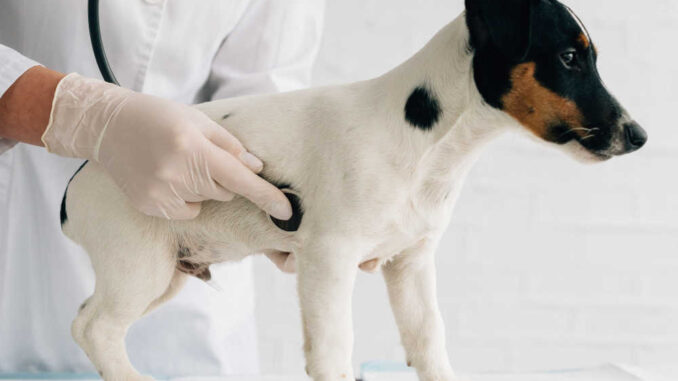
A client called one day and asked, “Hey doc, my dog’s stomach is making gurgling noises; is there anything I can do about it?” I explained there are various reasons that dogs’ stomachs gurgle and that some can be treated at home while others require veterinary care. In this article, we’ll look at the major causes of stomach gurgling in dogs, give you some things you can do to help your pup at home and explain when it’s time to head to the vet.
Gurgling stomach in dogs
Stomach gurgling, borborygmi, occurs when gas or fluid moves through the digestive system. Sometimes the sound is low and rhythmic, while at other times it sounds more like a freight train. Low rumbles are usually a normal part of digestion for your pooch, but if the sounds are suddenly louder, it may mean your furbaby’s stomach is upset.
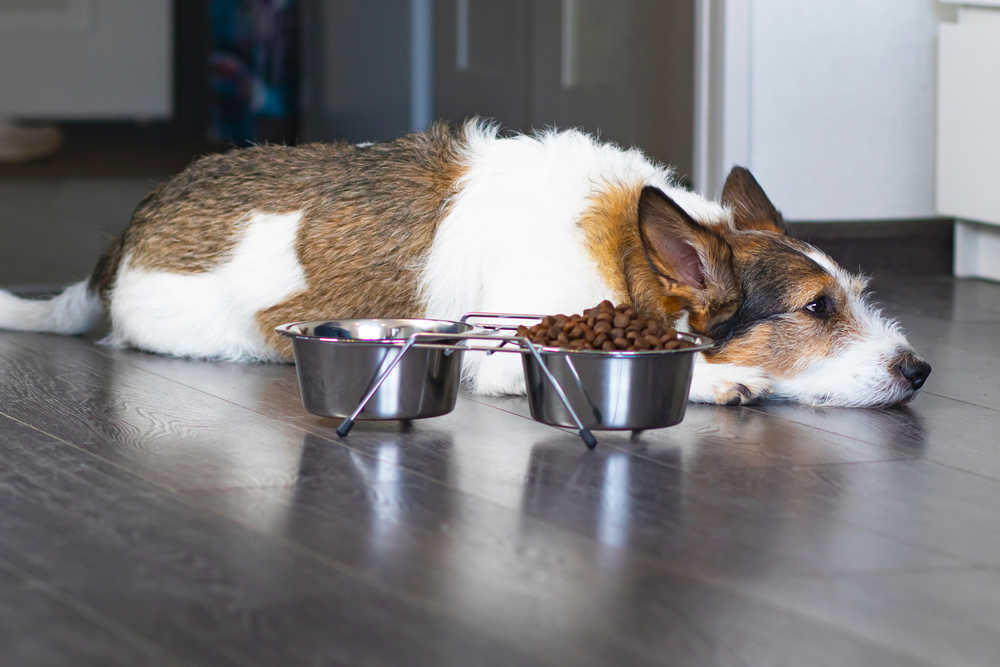
What causes gurgling stomachs in dogs? (with home remedies)
Normally, low gurgling sounds often occur when gas and digested food move through the gut. But if the sounds are louder than usual or occur with increased frequency, there may be an underlying condition. The main causes of stomach gurgling include:
1. Hunger/Meal-time
Dog stomachs make growling noises when empty because the digestive tract is full of gas. Your pup is probably just hungry if his stomach rumbles in the morning or before dinnertime. Feeding him should resolve the issue. There’s no need to call your vet for hunger sounds.
2. Stress
Dogs under stress bodies release hormones to help their bodies respond to the stimulus. The hormones also tend to trigger stomach gurgling. Stressed dogs may show other signs like hiding or acting clingy.
Some ways you can help your dog deal with stress include maintaining a familiar routine and providing a calm, quiet environment. If your dog’s anxiety is severe, talk to your veterinarian. He may be able to prescribe a calming agent or refer you to a behavioral specialist.
3. Upset stomach
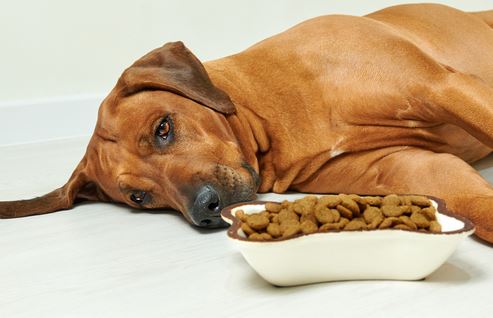
Dog stomachs commonly gurgle when they’re mildly upset. Your pup may experience digestive discomfort from:
- A new treat or change in diet
- Eating too fast and gulping air
- Dietary indiscretion
When dogs have an upset stomach, you may notice
- Active gurgling sounds
- Abdominal discomfort
- Flatulence
- Loss of appetite
A mild upset stomach will usually pass in a day or so. You can help your furbaby by fasting him for 1-2 meals. After that, you may want to put him on a bland diet of boiled rice and chicken for a few days and supplement his diet with probiotics to soothe the gut.
Take your dog to the vet if he
- Refuses to eat
- Has vomiting(more than 1-2 times) and diarrhea
- Drools excessively
- Regurgitates undigested food
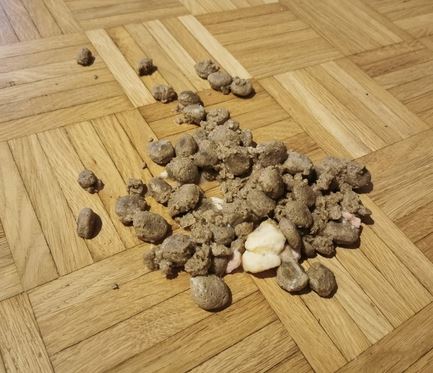
- Has a bloated abdomen
- Appears uncomfortable
There may be a more serious condition that requires treatment. Your doctor can evaluate your pooch and determine the next steps,
4. Medical conditions
Certain medical conditions can cause gurgling sounds. Examples include pancreatitis, inflammatory bowel disease, and liver disease. Dogs that suffer from a chronic or acute medical condition usually have other signs, like:
- Regurgitation or repetitive vomiting
- Drooling
- Diarrhea
- Lethargy or weakness
- Anorexia
If your dog shows these symptoms along with his stomach gurgles, you should take him to the veterinarian. The signs can indicate your dog has a serious condition that requires medical or surgical treatment. At the clinic, the vet will examine your pooch and run diagnostic tests to determine the cause of his symptoms. Treatment may include:
- IV fluids
- Fasting followed by a readily digestible diet
- Anti-nausea or antidiarrheal medications
- Anti-inflammatory drugs
- Antibiotics to treat secondary infections
5. Infection
Dogs infected with bacteria like salmonella or campylobacter can have gas buildup in the gut which causes the stomach to gurgle. When there’s a viral infection, the gut becomes hypermotile. Food moves through the system more quickly causing an increase in digestive sounds. Signs of gastrointestinal infections may include:
- Vomiting
- Watery diarrhea
- Fever
- Malaise or lethargy
- Anorexia
Your dog may be able to fight off a mild infection if you provide supportive care at home. Try fasting your pooch for 24 hours then introduce a bland diet. You can add probiotics to the food to help restore healthy gut flora. Do not give your dog antidiarrheal meds without your veterinarian’s approval.
If your dog’s symptoms are severe or if they continue beyond 1-2 days, take your dog to the vet. He can examine your dog and run diagnostic tests to help identify the underlying cause. Treatment may include:
- IV fluids to treat dehydration
- Antibiotics for bacterial infections
- Antidiarrheal or antiemetic drugs
- Antiinflammatory medications
6. Parasites
Gastrointestinal parasites like roundworms, hookworms, and tapeworms can trigger increased gut sounds. When the worms multiply in the intestines, they irritate the digestive tract and generate gas that makes gurgling noises. Dogs with parasites may also have
- Bloody poop
- Soft or liquid stool
- Swollen abdomen
- Rubbing or licking the rear end
- Increased or decreased appetite
If you suspect intestinal parasites, there are a few home remedies you can try. However, they don’t always work, and some options can harm your dog if you give them too much. Always consult with your vet before trying at-home remedies like:
- Pumpkin seeds – ground pumpkin seeds contain the natural anthelmintic cucurbitacin. This substance is an amino acid that can paralyze roundworms and tapeworms. As a result, the worms can’t attach to the intestines and are pooped out.
- Diatomaceous earth – Food-grade diatomaceous earth contains microscopic fossils that can damage the worm and cause it to dry out or die. The product is generally harmless to your dog.
- Chopped carrots – Coarsely-chopped carrots may help to scrub the intestinal wall and dislodge attached parasites from the digestive tract. They’re also a nutritious treat most dogs enjoy.
If you try a natural remedy, you should see improvement within a few weeks. Contact your veterinarian if Your dog
- Has repeated vomiting and diarrhea
- Becomes dehydrated
- Stops eating
- Becomes weak or lethargic
The doctor can run a fecal analysis and provide the appropriate anthelmintic medicine. Follow his recommendations for doses and frequency of repeated treatments.
7. Blockage
As notorious food vacuums, dogs can eat things they shouldn’t. Sometimes, the materials become lodged in the intestines causing a blockage. The backup of food causes gas buildup and gurgling sounds. This condition is an emergency that requires veterinary care. Signs include:
- Vomiting
- Restlessness/reluctance to lie down
- Abdominal pain
- Hunched appearance/praying posture
- Early diarrhea followed by constipation/straining to defecate
- Dehydration
- Loss of appetite
- Depression.
When you take your dog to the vet because he has signs of an obstruction, the doctor will examine your pup and take x-rays or an ultrasound to confirm the diagnosis. Treatment usually includes:
- Removal of the blockage by endoscopy or surgery
- IV fluid therapy
- Anti-inflammatory medications
- Painkillers
Can a gurgling stomach be caused by a more serious condition?
Many times, your dog’s gurgling sounds are related to minor conditions like hunger or a mild stomach upset. The gas sounds are usually the only symptom you’ll notice in these cases.
However, certain serious conditions and life-threatening emergencies can also produce stomach gurgles. When you hear rumbling sounds, monitor your dog for other concerning symptoms like vomiting/diarrhea, lethargy, and anorexia. If additional signs are present, contact your veterinarian immediately.
Wrapping it up: home remedies for a dog with a gurgling stomach
If your dog has a mildly upset stomach, there are some things you can try at home for a few days to help him feel better and recover.
Before you get started, observe your dog and determine whether his symptoms are mild enough to treat at home. If your furbaby is lethargic, has uncontrollable vomiting/diarrhea, or appears dehydrated, take him to the vet. Otherwise, follow these steps:
- Evaluate your dog’s hydration by checking his gum color or skin elasticity. The skin between his shoulders should quickly snap into place if you gently pinch and lift it. Additionally, the gums should be salmon or light pink and not feel dry or tacky.
- Fast your dog as long as he appears to be well-hydrated. Remove his food for 24 hours(12 hours for puppies) to help settle the stomach. If your dog’s vomiting continues despite the fast, call your vet.
- Give your dog ice chips to keep him hydrated. When your pup has an upset stomach, gulping water in large amounts may increase his nausea and cause continued vomiting. By offering ice chips at first, you can encourage drinking without overwhelming your dog’s gut. If he stops vomiting, you can slowly increase the amount of water in his bowl.
- Give your dog a bland diet for a few days. You can try a mixture of 3 parts boiled white rice and 1 part lean chicken or hamburger. If you don’t want to cook a meal, talk to your veterinarian about a bland, easily digestible commercial diet like Hill’s Prescription Plan I/D or Purina Proplan EN(both of these diets require a veterinary prescription). Divide the daily portion into about 4 smaller meals and feed your dog a little bit at a time. If he vomits the food, call your vet.
- Try a home remedy to settle your dog’s stomach. Once you know your dog can keep his food down, you can try one or more of the following remedies:
- Probiotics to help soothe the gut and restore normal flora
- Digestive enzymes to digest the food
- A tablespoon of plain yogurt with active, live cultures
- A spoonful of cottage cheese
- 1-2 tablespoons of plain, canned pumpkin
- Grated ginger sprinkled lightly over the food
- 2-3 tablespoons of crushed banana
When should I seek veterinary care?
If you suspect your dog’s stomach gurgling is due to a serious condition like an obstruction, take your dog to the vet. You should also contact your veterinarian for an exam if
- Your dog has repetitive vomiting/diarrhea or won’t eat
- The gurgling gets worse/louder
- The gurgling doesn’t subside in 24 hours or less
- Your dog is uncomfortable or in pain
- Your dog has a distended abdomen
- Your dog is dehydrated
Frequently asked questions
What should I do if my dog’s stomach is constantly gurgling?
If your dog’s stomach is constantly gurgling and won’t respond to at-home treatments, there may be a more severe condition than a mild stomach upset. Your dog may require prescription medications or other treatment. Call your veterinarian for an exam.
Can I give my dog over-the-counter antacids or medications?
Some over-the-counter medications may help your dog feel better, but it’s always best to speak with your veterinarian before using them. Dosing for canines and humans is usually different, and some medications can have serious side effects.
Are there any specific foods I should avoid feeding my dog when he has a gurgling stomach?
Some foods you should avoid giving your dog if he has a gurgling stomach include:
- High-fiber foods
- High-fat foods or diets
- Cruciferous vegetables that generate gas
- Dairy products
- Spicy foods
- Anything that your dog has an allergy or food sensitivity to
Disclaimer: This website's content is not a substitute for veterinary care. Always consult with your veterinarian for healthcare decisions. Read More.


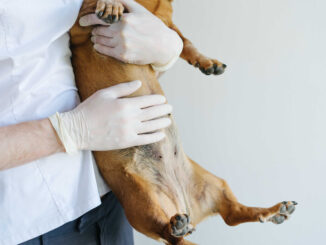


Be the first to comment